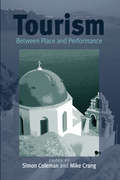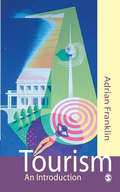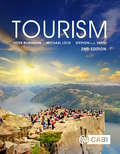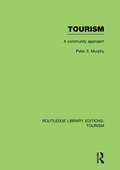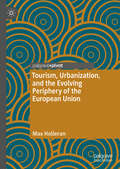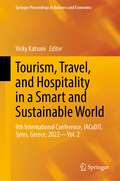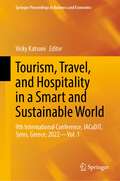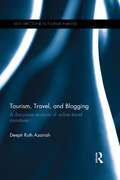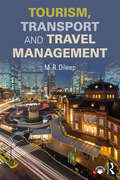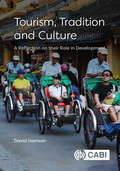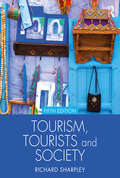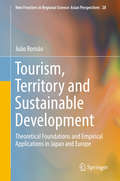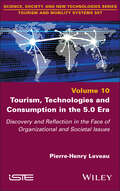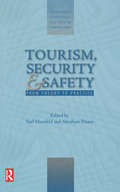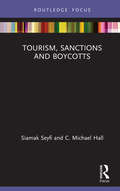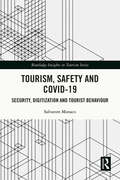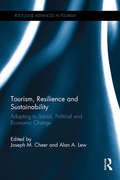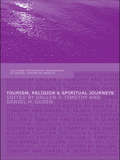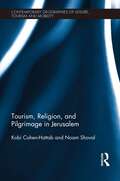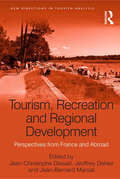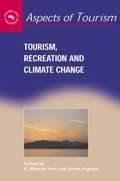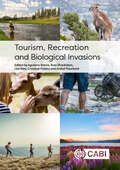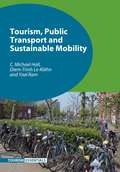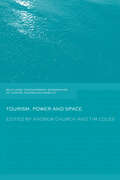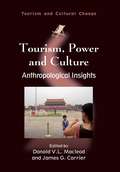- Table View
- List View
Tourism: Between Place and Performance (Berghahn Ser.)
by Simon Coleman Mike CrangMany accounts of tourism have adopted an almost paradigmatic visual model of the gaze. This collection presents an expanded notion of spectatorship with a more dynamic sense of embodied and performed engagement with places. The approach resonates with ideas in anthropology, sociology, and geography on performance, invented traditions, constructed places and traveling cultures. Contributions highlight the often contradictory, contested and paradoxical constructions of landscape and community involved both in tourist attractions and among tourists themselves. The collection examines many different practices, ranging from the energetic pursuit of adventure holidays to the reading of holiday brochures. It illustrates different techniques of seeing the landscape and a variety of ways of creating and performing the local. Chapters thus demonstrate the mutual entanglement of practices, images, conventions, and creativity. They chart these global flows of people, texts, images, and artefacts. Case studies are drawn from diverse types of tourism and destination focused around North America, Europe, and Australasia.
Tourism: An Introduction
by Adrian Franklin`Argued with a real verve, it makes a plea to rethink the role of tourism in modernity seeing it not as a fleeting and marginal element, but as something enduring, emblematic and constitutive of contemporary society. Tourism is seen as a key element of modern life, not an escape from it' - Mike Crang, Department of Geography, University of Durham Tourism is a rapidly growing area of student enrolment. Lecturers and students who have waited patiently for an up-to-date, lucid and indispensable teaching and research text, need wait no more. This book is a matchless guide to understanding the theory, practice, development and effects of tourism. Tourism: An Introduction: - equips students with a critical perspective of the central processes of tourism and the relationship between tourism and culture - places tourism at the heart of modern life rather than as a peripheral feature added on after work - illuminates the relationship between tourism and nation formation, citizenship, consumerism and globalization - reveals the ritual, performative and embodied dimensions of tourist experience This book offers readers a major synthesis of modern thought on tourism. It breaks the mould of approaching tourism as a self-contained, compartment of contemporary life and treats it as a major and exciting cultural phenomenon. This is a landmark work in the study of tourism. Adrian Franklin is the editor of the acclaimed journal Tourist Studies (SAGE Publications).
Tourism: A Regional Review (Contemporary Tourism Reviews Ser.)
by Stephen Smith Dr Michael Lück Dr Peter RobinsonFully revised, Tourism, 2nd edition covers aspects of tourism from a modern perspective, providing students with a range of theoretical and research-based explanations, supported by examples, case studies and unique insights from industry representatives. The many facets of tourism management are presented in a style that is as relevant for 1st year students as it is for postgraduates. The text offers introductory definitions and detailed discussions of contemporary issues that recognize current teaching practice around the world. Covering topics such as policy and planning, heritage management, leisure management, event management and hospitality management, the book tackles the practical elements of academic tourism such as infrastructure management and economic development, together with other important contemporary issues such as sustainable development and post-tourists. This new edition also features: · Updated and new contemporary case studies, including countries such as Egypt, Croatia and The Philippines · New material on · tourism and sustainability including the SDGs · Unions in the travel and tourism sectors · Gender issues in travel and tourism · Augmented reality and robots · Prosumption and co-creation · Contributions from professionals working in the tourism industry for a real-world perspective · A fresh new layout and full colour text and figures that make it easy to locate information and aid learning · Links to new video material throughout, which provide easy access to additional content for further study This will be an essential text for all students of travel and tourism at all levels of study.
Tourism: A Community Approach (Routledge Library Editions: Tourism #Vol. 16)
by Peter E MurphyWritten in 1989 when the modern tourist industry had reached a crucial stage in its development, when increased mobility and affluence had led to more extensive and extravagant travel, and competition within the industry had intensified, this book is comprehensive examination of tourism development. The author provides a new perspective for its evaluation, and a suggested strategy for its continued development and evolution. He examines tourism from the viewpoint of destination areas and their aspirations, and recommends an ecological, community approach to developing and planning – one which encourages local initiative, local benefits, and a tourism product in harmony with the local environment and its people.
Tourism, Urbanization, and the Evolving Periphery of the European Union
by Max HolleranThis book explores travel, tourism, and urban development at the edges of Europe from the 1970s until the present. It compares tourism-spurred urban growth in Spain and Bulgaria, showing how development in Southern Europe after the fall of dictatorships provided a model for integrating post-socialist Europe in the 1990s. It analyzes the economic, cultural, and political dimensions of tourist economies, showing how they aligned with major European Union integration goals and were supported with EU development funds. It also chronicles the social and environmental costs of mass tourism where over-development has despoiled beachfronts and promoted low paying service jobs, reinforcing regional divisions in Europe between those who host and those who visit. Ultimately, it argues that while mass tourism is touted as a viable economic solution to EU inequality, it can potentially exacerbate disparities between core and peripheral zones, creating new and troubling forms of regional polarization.
Tourism, Travel, and Hospitality in a Smart and Sustainable World: 9th International Conference, IACuDiT, Syros, Greece, 2022 - Vol. 2 (Springer Proceedings in Business and Economics)
by Vicky KatsoniThis book features the second volume of the proceedings of the 9th International Conference of the International Association of Cultural and Digital Tourism (IACuDiT). Held at the Syros Island in Greece in September 2022, the conference's lead theme was ‘Tourism, Travel, and Hospitality in a Smart and Sustainable World’.With a full appreciation of the contributions made by numerous writers toward the progress in tourism research, this book presents a critical academic discourse on sustainable practices in a smart tourism context, stimulating future debates and advancing knowledge and understanding in this critical area of knowledge. It also puts emphasis on the knowledge economy and smart destinations notion. It enacts new modes of tourism management and development and presents chapters on cultural heritage tourism, emerging technologies and tourism consumer behaviour, such as tourism education, location-based services, Internet of Things, smart cities, mobile services, gamification, digital collections and the virtual visitor, social media, social networking, and augmented reality.
Tourism, Travel, and Hospitality in a Smart and Sustainable World: 9th International Conference, IACuDiT, Syros, Greece, 2022 - Vol. 1 (Springer Proceedings in Business and Economics)
by Vicky KatsoniThis book features the second volume of the proceedings of the 9th International Conference of the International Association of Cultural and Digital Tourism (IACuDiT). Held at the Syros Island in Greece in September 2022, the conference's lead theme was ‘Tourism, Travel, and Hospitality in a Smart and Sustainable World’.With a full appreciation of the contributions made by numerous writers toward the progress in tourism research, this book presents a critical academic discourse on sustainable practices in a smart tourism context, stimulating future debates and advancing knowledge and understanding in this critical area of knowledge. It also puts emphasis on the knowledge economy and smart destinations notion. It enacts new modes of tourism management and development and presents chapters on emerging technologies, such as location-based services, Internet of Things, smart cities, mobile services, gamification, digital collections and the virtual visitor, social media, social networking, and augmented reality
Tourism, Travel, and Blogging: A discursive analysis of online travel narratives (New Directions in Tourism Analysis)
by Deepti Ruth AzariahTravel often inspires the creation of narratives about journeys and destinations, more so with the increasing availability of online platforms, applications for smartphones and tablets, and various other social media technologies. This book examines travel blogs and their associated social media as a form of self-presentation that negotiates the tensions between discourses of travel and tourism. As such, it addresses how contemporary travellers use online platforms to communicate their experiences of journeys and destinations, and how the traveller/tourist dichotomy finds expression in these narratives. Addressing the need for more in-depth analysis through a study of blogs, this exploration of networked narratives of an individual’s travel experience considers personal motivations, self-promotion, and self-presentation as key factors in the creation of both personal and commercial travel blogs. As this text applies concepts such as self-presentation and heteroglossia, it will be of interest to both students and scholars of tourism, new media, sociology, cultural studies, and discourse studies.
Tourism, Transport and Travel Management
by M.R. DileepThe terms travel and tourism are often used interchangeably in tourism literature. This comprehensive textbook provides students with essential knowledge of the intricate relationship existing between travel, transport and tourism. The book analyses the structure, functions, activities, strategies and practices of each of the sectors in the travel industry, such as airlines, airports, tour operators, travel agencies and cruises. It is structured into six parts, covering all modes of transport (air, land and water), travel intermediation, the tour operation business and impacts and prospects for the future. International case studies are integrated throughout to showcase practical realities and challenges in the travel industry and to aid students’ learning and understanding. Written in an accessible and engaging style, this is an invaluable resource for students of tourism, hospitality, transport and travel management courses.
Tourism, Tradition and Culture: A Reflection on their Role in Development
by David HarrisonDavid Harrison has contributed to the academic study of tourism over the last 30 years. This book brings together a collection of his published material that reflects the role played by tourism in 'development', both in societies emerging from Western colonialism and in societies previously part of the Soviet system. The overarching theme looks at how, promoted as a tool for development, tourism can lead to conflict between competing elites, but can also empower groups previously subject to constraint by traditional authorities. Tradition is intensely manipulatable and always reflects power relations. Such pressure on tradition is but one aspect of tourism's wider social impacts. This includes changes in economic and social structure, which, for many, constitute social problems that need to be addressed. At the same time, 'sustainability', though apparently a worthy aim, can be a problematic concept, especially when applied to 'traditional' cultures, and may conflict with such ideals as egalitarianism.
Tourism, Tourists and Society (Tourism, Tourists And Society Ser.)
by Richard SharpleyTourism, Tourists and Society provides a broad introduction to the inter-relationship between tourism and society, making complex sociological concepts and themes accessible to readers from a non-sociological academic background. It provides a thorough exploration of how society influences or shapes the behaviours, motivations, attitudes and consumption of tourists, as well as the tourism impacts on destination societies. The fifth edition has been fully revised and updated to reflect recent data, concepts and academic debates: • New content on: mobilities paradigm and the emotional dimension of tourist experiences. • New chapter: Tourism and the Digital Revolution, looking at the ways in which the Internet and mobile technology transform both tourist behaviour and the tourist experience. • New end-of-chapter further reading and discussion topics. Accessible yet critical in style, this book offers students an invaluable introduction to tourism, tourists and society.
Tourism, Territory and Sustainable Development: Theoretical Foundations and Empirical Applications in Japan and Europe (New Frontiers in Regional Science: Asian Perspectives #28)
by João RomãoWelfare rise, spatial mobility, and global information and communication channels (in particular, social media) have prompted the emergence of a specific booming and rapidly growing mobility industry all over the world, namely tourism. The tourist sector (including recreation and leisure activities) has turned into a complex contemporaneous socio-economic and geographic phenomenon, with a multiplicity of travel motives (e.g., entertainment, culture, relaxed life style, wellness, nature, etc.) and with a wide variety of impacts (e.g., urban- and regional-economic effects, crowding phenomena, environmental decay, etc.). Time has now come to offer a synthesis of the analytical apparatus in tourism research, with particular attention for system-wide, socio-economic and environmental dimensions of this important global industry. Tourism has in the past been a largely neglected field in regional science research. And therefore, it is laudable that João Romão has taken the decision to compose a systematically designed and well crafted monograph on the socio-economic, environmental and spatial dimensions of modern tourism. It offers a wealth of analytical insights and quantitative research tools for advanced tourism studies. It also fills an important gap in the current regional science literature. Peter Nijkamp, Tinbergen Institute, Amsterdam
Tourism, Technologies and Consumption in the 5.0 Era: Discovery and Reflection in the Face of Organizational and Societal Issues (ISTE Invoiced)
by Pierre-Henry LeveauHistory shows us that technologies help humankind in our daily activities. Every major technological evolution brings about an economic, cultural and social revolution, transforming the lifestyles of citizens, professional organizations and consumer practices. Digital technologies are a perfect illustration of this, and tourism is no exception. Soon, the technologies of the "X.0" generation (AI, cobots, biotechnologies, etc.) will herald a new socio-technological revolution, ushering in the 5.0 era. Tourism, Technologies and Consumption in the 5.0 Era explores the role and challenges of new technologies in “Society 5.0”, which is gradually transforming the practices of both tourism professionals and travelers. Faced with the challenges of climate change and sustainable development, it examines the opportunities and limits of bionumeric technologies for more sustainable and responsible tourism. This book helps us decipher a world in transition, where digital technologies will reinvent consumer experiences, particularly in tourism, and encourage more socially responsible behavior.
Tourism, Security and Safety
by Yoel Mansfeld Abraham PizamThe topic of safety and security in the tourism industry is of vital importance globally. In recent years, and mainly after the 9/11 event, both academics and practitioners have started to look into crisis management issues seeking workable solutions in order to mitigate the negative impacts of safety and security incidences on the tourism industry and affected destinations. Tourism, Safety and Security: a multi dimensional analysis brings together the writings of international leading academics and practitioners in this field to discuss prevention measures and crisis management options, in incidences of tourism safety and security. The layout and content of the book are aimed at analyzing different types of safety and security problems as well as finding managerial strategies and tactics to address them. Divided into four sections this book looks at:· Tourism and security issues: including the impact of terror in the hotel market in Israel· Tourism and crime issues: including premises liability, drug trafficking, theft and street robbery · Tourism and safety Issues: including the impact of SARS in Asia and Foot and Mouth Disease in the UK· Tourism crisis management issues: including the 9/11 crisis, public relations, and the aftermath of the Bali bombingsEach chapter has a user friendly structure including study objectives, concept definitions and review questions.
Tourism, Sanctions and Boycotts (Routledge Focus on Tourism and Hospitality)
by C. Michael Hall Siamak SeyfiThis is the first book to provide a comprehensive account of sanctions and boycotts in tourism and the economic and ethical complexities that policy makers, tourists, tourism destinations, and businesses face. Sanctions and boycotts are an important feature of the global tourism system and the emerging ethics of tourism. Sanctions and embargoes are increasingly used as coercive instruments of diplomacy and foreign policy by the United Nations, supranational organizations, the US, and other nations to change the actions and behaviors of countries, organizations, businesses, and individuals. At the same time, boycotts and buycotts are a growing feature of political consumerism and interest group activism. Tourism and hospitality destinations, attractions, and businesses can be profoundly affected by this, with the legacy of a negative image lasting for decades. International travel to some destinations may be severely restricted, financial investment and supply chains disrupted, and, in the most comprehensive sanctions and boycotts, substantial economic and personal hardship may be experienced. This book is of interest not only to policy makers, destination management and marketing organizations, and students of crisis and politics in tourism and hospitality but also those who seek to address the interrelationships between sanctions, tourism destinations and attractions, and the tourists who boycott them.
Tourism, Safety and COVID-19: Security, Digitization and Tourist Behaviour (Routledge Insights in Tourism Series)
by Salvatore MonacoThis book offers empirical insights on key challenges faced by the travel and tourism industries in the post-COVID-19 era. The desire to make tourism safe is gaining ground, but what does this mean? This book explores the guarantees travelers want in the postpandemic era and how individual territories are predicting and responding to these needs. It explores the role of innovation and digital solutions, assures tourists different ways of using services, both physical and digital. It considers how the commitment of smart tourist cities to technology, sustainability and accessibility is able not only to improve the quality of travelers’ tourist experience, but also the quality of life of local inhabitants. This book considers the main solutions that many destinations are already experimenting, around the world to respond to the new safety demands of travelers.
Tourism, Resilience and Sustainability: Adapting to Social, Political and Economic Change (Routledge Advances in Tourism)
by Alan A. Lew Joseph M. CheerIn a world increasingly faced with, and divided by, regional and global crises, resilience has emerged as a key concept with significant relevance for tourism. A paradigmatic shift is taking place in the long-term planning of tourism development, in which the prevailing focus on sustainability is being enhanced with the practical application of resilience planning. This book provides a critical appraisal of sustainability and resilience, and the relationship between the two. Contributions highlight the complexity of addressing social change with resilience planning in a range of tourism contexts, from islands to mountains, from urban to remote environments, and in a range of international settings. Case studies articulate how tourism is both an agent of social change and a victim of larger change processes, and provide important lessons on how to deal with increasingly unstable economic, social and environmental systems. This is the first book to specifically examine social change and sustainability in tourism through a resilience lens. This much-needed contribution to the literature will be a key resource for those working in tourism studies, tourism planning and management, social geography, and development studies, among others.
Tourism, Religion and Spiritual Journeys (Contemporary Geographies of Leisure, Tourism and Mobility)
by Dallen J. Timothy Daniel H. OlsenReligion and spirituality are still among the most common motivations for travel - many major tourism destinations have developed largely as a result of their connections to sacred people, places and events. Providing a comprehensive assessment of the primary issues and concepts related to this intersection of tourism and religion, this revealing book gives a balanced discussion of both the theoretical and applied subjects that destination planners, religious organizations, scholars, and tourism service providers must deal with on a daily basis. Bringing together a distinguished list of contributors, this volume takes a global approach and incorporates substantial empirical cases from Hinduism, Islam, Judaism, Roman Catholicism, Mormonism, New Ageism, Sikhism, Buddhism, and the spiritual philosophies of East Asia. On a conceptual level, it considers, amongst other topics: contested heritage the pilgrim-tourist dichotomy secularization of pilgrimage experiences religious humanism educational aspects of religious tourism commodification of religious icons and services. A vibrant collection of essays, this outstanding book discusses many important practices, paradigms, and problems that are currently being examined and debated. It raises an array of significant and interesting questions and as such is a valuable resource for students, scholars and researchers of tourism, religion and cultural studies.
Tourism, Religion and Pilgrimage in Jerusalem (Contemporary Geographies of Leisure, Tourism and Mobility)
by Noam Shoval Kobi Cohen-HattabJerusalem is a city with a singular nature. Home to three religions, it contains spiritual meaning for people the world over; it is at once a tourist destination and a location with a complex political reality. Tourism, therefore, is an integral part of Jerusalem’s development and its political conflicts. The book traces tourism and pilgrimage to Jerusalem from the late Ottoman era, through the British Mandate, during the period of the divided city, and to the reunification of the city under Israeli rule. Throughout, the city’s evolution is shown to be intertwined with its tourist industry, as tourist sites, accommodations, infrastructure, and services transform the city’s structures and open spaces. At the same time, tourism is wielded by various parties in an effort to gain political recognition, to bolster territorial control, or to garner support. The city’s future and the role tourism can play in it are examined. While the construction of a “security fence” will have many implications on Jerusalem’s tourist industry, steps are proposed to minimize the effects of the security fence and optimize tourism. Written by leading academics, this title will be valuable reading for students, academics, and researchers in the fields of tourism, religious studies, geography, history, cultural studies, and anthropology.
Tourism, Recreation and Regional Development: Perspectives from France and Abroad (New Directions in Tourism Analysis)
by Jean-Christophe Dissart Jeoffrey Dehez Jean-Bernard MarsatWhat factors contribute to tourism and recreation development? How can we characterise stakeholder rationales and organisation modes to enhance tourism resources and foster tourism and recreation services? To what extent do tourism and recreation contribute to regional development? What changes are taking place in terms of new destinations, stakeholders, policy objectives? Bringing together scholars from the fields of planning, economics, sociology, management studies and geography, this book examines cross-cutting issues in tourism and recreation with the aim of developing an extended view of leisure time. Focusing mainly on France with comparison to the experience of Northern and Southern European countries and North America, it combines a diverse range of case studies to address issues such as contrasting rural dynamics, changing public policies, sustainable development imperatives, evolving user behaviour and increasingly diverse recreation activities and stakeholder organisation. Specific topics are highlighted, such as the role of social capital or culture as factors of recreation development; resort organisation from international and experience-based perspectives; and the usefulness of the capability approach to evaluate tourism impacts on local development. Emphasising policy recommendations to help public or collective action on the issues and presenting emerging trends in the field, this book should be of interest to students, scholars and stakeholders in tourism/recreation planning and management.
Tourism, Recreation and Climate Change
by James Higham C. Michael HallClimate change is one of the major issues facing us today and has been described as a threat greater than terrorism. As the world's largest industry tourism both contributes to and will be dramatically affected by climate change. This is the first comprehensive book-level examination of the relationship between tourism and climate change, of interest not only to students of tourism but to policy makers and the industry who will have to respond to the challenges posed.
Tourism, Recreation and Biological Invasions
by Agustina Barros, Ross Shackleton, Lisa J. Rew, Cristóbal Pizarro and Aníbal PauchardThe first section of the book includes information about how tourism-related infrastructure and activities promote biological invasions, including key pathways for non-native invasive species introductions. This section provides case studies of different organisms that are known to be introduced and/or promoted by tourism in different ecosystems or regions. The second section elaborates on known and potential impacts of invasive species on tourism and recreation, including how they may affect, positively or negatively, the economic revenue from tourism, tourist access, recreation, aesthetic values and tourists' perceptions. The last section focuses on management and policy, covering aspects of how visitors perceive invasive species and their willingness to manage them, biosecurity measures to prevent invasion related to tourism, as well as potential policy options moving forward. The book draws on a number of examples across multiple taxa, landscapes and regions of the world.
Tourism, Public Transport and Sustainable Mobility
by C. Michael Hall Diem-Trinh Le-Klähn Yael RamThis book offers a comprehensive global examination of the relationship between public transport and tourism as well as exploring other sustainable transport modes. It offers a unique view by analysing tourism through the public transport lens and vice versa. The volume provides an account of how the public transport experience can be improved for tourists so that its value can be maximised and a greater number of people can be encouraged to shift modes. It features a wide range of case studies and examples showing how the tourism industry, as well as regional economies, communities and the environment, benefit when public transport is widely used by tourists. The book will be of interest to researchers and students in the fields of tourism and transport as well as destination marketing organisations and tourism, transport and urban planners.
Tourism, Power and Space (Contemporary Geographies of Leisure, Tourism and Mobility)
by Tim Coles Andrew ChurchThis is the first volume to explicitly consider how leisure and tourism acts as a major focus by which power may be understood in a geographical context. Key thinking and major approaches to unravelling the complexities of power are outlined in this collection and their relevance to current and future tourism studies is discussed. Tourism, Power and Space blends theoretical perspectives from leading power theorists such as: Parsons, Foucault and Clegg. Exploring the intricacies of the relationships between power, tourism and leisure, this stimulating volume combines theoretical and empirical writings to illustrate the extent to which power, in its various forms and guises and at various scales of operation, impacts on the unfolding structures, practices and organization of tourism and leisure on both the demand and supply sides. Divided into three sections: Power, Performance And Practice, Power, Property And Resources and Power, Governance And Empowerment; this text will be a useful resource for students and academics alike.
Tourism, Power and Culture
by James G. Carrier Donald V.L. MacleodTourism as an experience and an industry is infused by culture in its various dimensions, and influenced throughout by relationships of power; this is particularly apparent at the destination site. Anthropological investigations give rich insights into power and culture through ethnographic fieldwork, comparative analysis and theoretical explanation. Within this timely and groundbreaking book case studies come from Latin America, the Caribbean, Europe, Africa, Australia and South East Asia. It is divided into two sections dealing with tourism and the power struggle for resources; and tourism and culture: presentation, promotion and the manipulation of image. Chapters explore issues as diverse as terrorism, ethnicity and World Heritage Sites, and the role of the analysis of power in tourism studies. They illustrate how culture shapes tourism development, is commodified, and becomes a tool in political and economic strategies and struggles.
